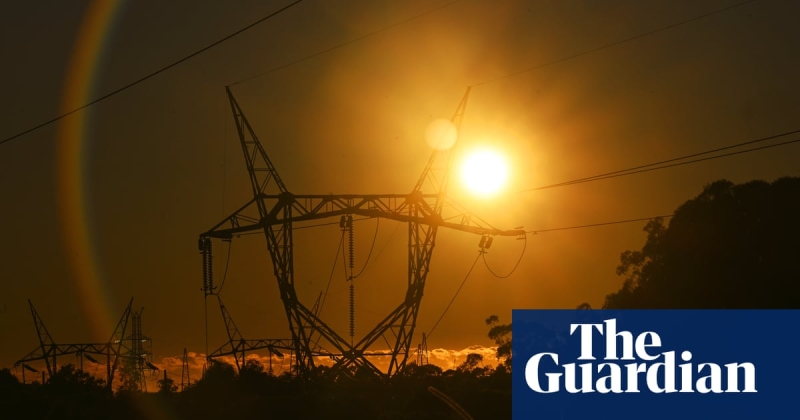Opposition leader claims a 44% cost reduction compared with Labor’s plan would be passed on to Australian household bills, but not everyone agrees
Energy experts have rubbished claims by Peter Dutton that his plan to slow the rollout of renewable energy while waiting more than a decade for taxpayer-funded nuclear plants could bring down electricity bills in the short term.
Dutton said if there was “a 44% reduction in the model of delivering an energy system, you would expect a 44% reduction, or of that order, being passed through in energy bill relief”.
However, that was a “complete misunderstanding “of the Coalition’s own policy, according to Dr Dylan McConnell, an energy systems expert at the University of New South Wales. “He has no idea what he is talking about,” McConnell said.
Speaking to the ABC’s Insiders program on Sunday, Dutton said “power prices will be cheaper under us in the near term as well as in the medium to longer term as well”.
If elected, the Coalition would have to overturn federal and state bans on nuclear power; it claims it could have the first plants built by 2037. Experts, including the CSIRO, say the early 2040s is a more realistic timeframe.
The Coalition has not revealed any details on its near-term plans for electricity generation but Dutton said “we’re going to have to do a lot more with gas, with coal, in the system”.
Analysis by McConnell suggested the Coalition’s reliance on more coal and gas would add 1.7bn tonnes of CO2 to the atmosphere by 2050, compared with Labor’s plan.
Data from the CSIRO suggests using gas for power generation is more expensive than coal, and solar and wind. Nuclear electricity would be at least 50% more expensive than renewables, the CSIRO has said.
Gas prices tripled when the Coalition was in power, according to Tristan Edis, an analyst at Green Energy Markets.
He said energy prices were likely to fall over the next two years after the inflation caused by Russia’s invasion of Ukraine subsides.
“Beyond this two-year period, it is difficult to understand how the Coalition will lower power prices if they intend to simply rely on the power plants which are already in place and not foster additional competition,” he said.
“The coal plants are getting old and banks are reluctant to finance refurbishment costs. If we rely on additional gas, that will push up power prices, not reduce them – because gas is expensive.”
Edis said the Coalition’s costs for building a 1GW nuclear plant had been set at $1bn, which was “unrealistically low” and could be at least double that. This would push up wholesale electricity prices and household bills, he said.
Frontier Economics released modelling, backed by the Coalition, that compared the cost of Labor’s preferred renewables-based plan with an electricity system that anticipates less demand for electricity and includes nuclear.
Of Dutton’s claim that modelling showed the Coalition’s approach would cost 44% less than Labor’s plan, McConnell was doubtful.
“That’s a clear misunderstanding of what makes up an electricity bill and what the [modelling report] shows.”
He said only about 45% of a household electricity bill related to the cost of the electricity system and the wholesale costs that relate to the cost of the system referred to by Dutton. The rest related to the costs of local poles and wires, retail costs and environmental charges.
Danny Price, managing director of Frontier Economics, defended Dutton’s comments, saying if he was referring to the energy costs portion of people’s bills then the lower cost should transfer to households.
But on the impact on households’ overall electricity bills, “it’s a much more complicated question” he said, because of uncertainties around how prices are set in the market.
For that reason, his company had not attempted to forecast what the Coalition’s plan would do for people’s electricity bills or to electricity prices.





